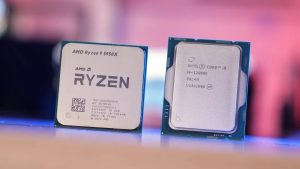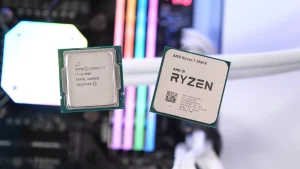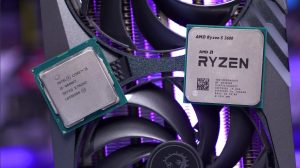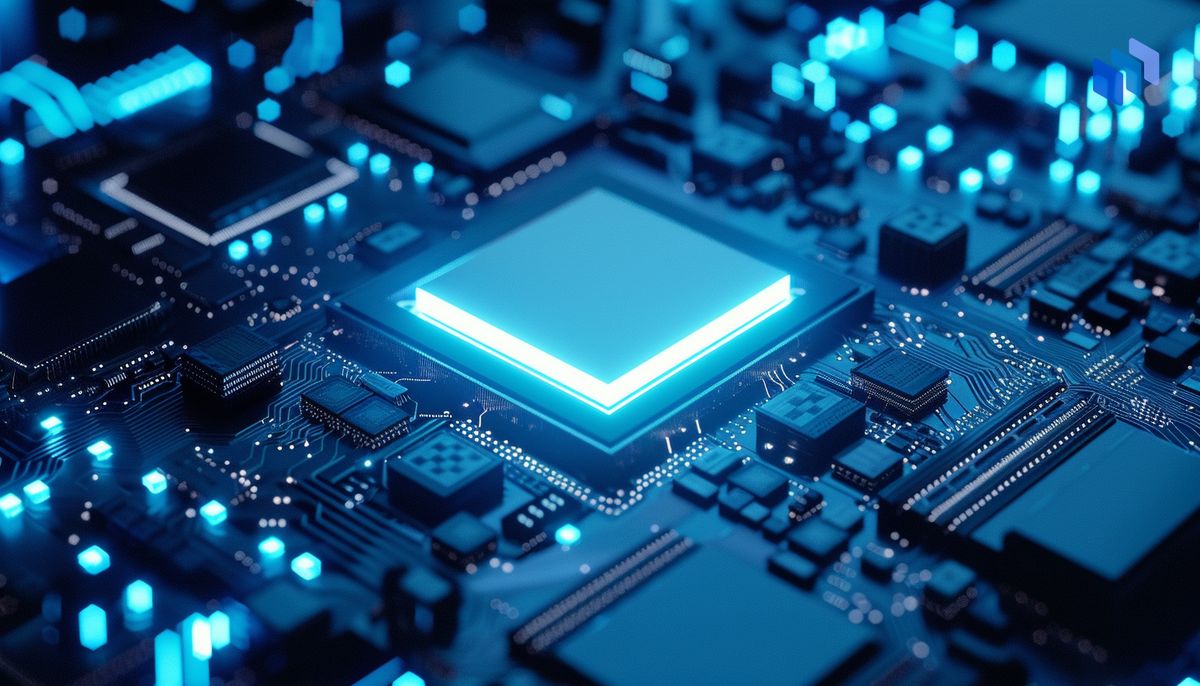The world of computer processors has been dominated by two giants: AMD and Intel. For decades, these companies have been locked in a fierce battle for supremacy, constantly pushing the boundaries of performance, efficiency, and innovation. This rivalry has driven the evolution of CPUs, bringing faster, more powerful, and more affordable options to consumers and businesses alike.
Intel vs. AMD competition dates back to the late 1960s when AMD was founded as a second-source manufacturer for Intel’s chips. However, the rivalry truly intensified in the 1990s when AMD introduced its own x86 processors, challenging Intel’s dominance.
Since then, the two companies have traded blows, with each taking the lead at various times. Intel held a strong advantage in the early 2000s, but AMD struck back with its groundbreaking Ryzen processors in 2017, reigniting the competition and forcing Intel to innovate faster.
Is AMD better than Intel in 2024? Or vice versa? In this article, we compare Intel vs. AMD processors to help you choose which will work best for your laptop and particular needs, whether it’s content creation or gaming.
Key Takeaways
- AMD and Intel dominate the CPU market.
- Intel leads in overall performance and value.
- AMD excels in power efficiency and specialized gaming CPUs.
- Both offer a wide range of options for different needs and budgets.
AMD vs. Intel Processors: Side-by-Side CPU Comparison
When it comes to choosing a CPU, understanding the differences between AMD and Intel processors is crucial.
In this section, we’ll take a closer look at how AMD and Intel stack up against each other in various processor categories, from high-end to budget options.
By comparing AMD Ryzen vs. Intel Core specifications and features side-by-side, you’ll be better equipped to make an informed decision based on your needs and budget.
AMD Ryzen 9 vs. Intel Core i9

The AMD Ryzen 9 and Intel Core i9 series represent the pinnacle of consumer-grade CPU performance.
These processors offer the highest core counts, clock speeds, and cache sizes, making them ideal for demanding tasks such as content creation, high-end gaming, and heavy multitasking.
| Specification | AMD Ryzen 9 5950X | Intel Core i9-12900K |
| Cores/Threads | 16/32 | 16 (8P + 8E)/24 |
| Base Clock | 3.4 GHz | 3.2 GHz (P-core) |
| Boost Clock | 4.9 GHz | 5.2 GHz (P-core) |
| Cache (L2+L3) | 72 MB | 44 MB |
| TDP | 105W | 125W (241W MTP) |
AMD Ryzen 7 vs. Intel i7

The AMD Ryzen 7 and Intel Core i7 series are popular choices for PC enthusiasts, workstation users, and laptop users. They are commonly used for programming.
They offer a balance of high performance and reasonable pricing, making them suitable for gaming, content creation, and general productivity.
| Specification | AMD Ryzen 7 5800X | Intel Core i7-12700K |
| Cores/Threads | 8/16 | 12 (8P + 4E)/20 |
| Base Clock | 3.8 GHz | 3.6 GHz (P-core) |
| Boost Clock | 4.7 GHz | 5.0 GHz (P-core) |
| Cache (L2+L3) | 36 MB | 37 MB |
| TDP | 105W | 125W (190W MTP) |
AMD Ryzen 5 vs. Intel i5

The AMD Ryzen 5 and Intel Core i5 series are the most popular choices for mainstream users.
They provide excellent performance for gaming and everyday tasks at affordable price points.
| Specification | AMD Ryzen 5 5600X | Intel Core i5-12600K |
| Cores/Threads | 6/12 | 10 (6P + 4E)/16 |
| Base Clock | 3.7 GHz | 3.7 GHz (P-core) |
| Boost Clock | 4.6 GHz | 4.9 GHz (P-core) |
| Cache (L2+L3) | 35 MB | 29.5 MB |
| TDP | 65W | 125W (150W MTP) |
AMD Ryzen 3 vs. Intel Core i3
For entry-level users and those on a tight budget, the AMD Ryzen 3 and Intel Core i3 series offer good performance at affordable prices.
These processors suit basic computing tasks, light gaming, and office work.
| Specification | AMD Ryzen 3 3300X | Intel Core i3-12100 |
| Cores/Threads | 4/8 | 4/8 |
| Base Clock | 3.8 GHz | 3.3 GHz |
| Boost Clock | 4.3 GHz | 4.3 GHz |
| Cache (L2+L3) | 18 MB | 12 MB |
| TDP | 65W | 60W (89W MTP) |
AMD vs. Intel Processor: Which Is Better?
Performance is often the most critical factor when choosing between AMD and Intel processors.
In this section, we’ll explore which company makes the fastest processors and compare Intel vs. Ryzen performance in gaming, productivity, and content creation tasks to determine which is better.
Which Company Makes the Fastest Processors?
As of 2024, Intel holds the crown for the fastest processors in most price ranges.
Intel’s Raptor Lake CPUs, particularly the high-end Core i9 and Core i7 models, offer exceptional single-threaded and multi-threaded performance, making them the top choice for users who demand the best performance across a wide range of tasks when comparing the two.
However, AMD’s Ryzen processors, especially the Ryzen 9 and Ryzen 7 series, are close behind and offer strong competition in terms of multi-threaded performance.
AMD’s processors also tend to be more power-efficient, which can be an important consideration for some users when deciding between them.
AMD vs. Intel Gaming Performance
Is AMD or Intel better for gaming?
When it comes to gaming performance, Intel processors generally hold the lead across most price ranges.
Intel’s strong single-threaded performance and high clock speeds give them an advantage in games that rely heavily on single-core performance, making them the best CPU for gaming in most scenarios.
| Processor | Average FPS (1080p) |
| Intel Core i9-12900K | 145 |
| AMD Ryzen 9 5950X | 139 |
| Intel Core i7-12700K | 142 |
| AMD Ryzen 7 5800X | 136 |
| Intel Core i5-12600K | 139 |
| Intel Core i5-12600K | 133 |
When considering whether AMD or Intel is better for gaming, these results show that Intel processors generally offer better gaming performance across various price points.
AMD’s 3D V-Cache CPUs for high-end gaming
However, AMD has recently introduced its Ryzen 7000X3D series processors, which feature 3D V-Cache technology. These CPUs offer unparalleled gaming performance, particularly in games that benefit from the increased cache size.
The AMD Ryzen 7 5800X3D and Ryzen 9 5900X3D are currently the fastest gaming processors available, surpassing even Intel’s high-end offerings in most gaming scenarios, making them the top choice for gaming in the high-end segment.
Productivity & Content Creation Performance
Intel processors generally excel in single-threaded tasks, such as photo editing, basic video editing, and everyday productivity applications. This is due to their high clock speeds and strong single-core performance.
On the other hand, AMD CPUs tend to perform better in heavily multi-threaded workloads, such as video rendering, 3D modeling, and other content creation tasks that can take advantage of a higher core count.
AMD’s Ryzen 9 and Threadripper processors are particularly well-suited for these types of workloads.
| Processor | Cinebench R23 Multi-Core |
| AMD Ryzen 9 5950X | 28,860 |
| Intel Core i9-12900K | 27,495 |
| AMD Ryzen 9 5900X | 21,910 |
| Intel Core i7-12700K | 20,305 |
Laptop Processors: AMD vs. Intel
The processor is one of the most important factors to consider when choosing a laptop. In this section, we’ll compare AMD vs Intel laptop processors, examining their performance, efficiency, and overall presence in the mobile market.
Historically, Intel has dominated the laptop processor market, with a wide range of offerings across various price points and form factors. However, in recent years, AMD has made significant strides in the mobile space, gaining market share and offering competitive alternatives to Intel’s mobile processors.
The difference between AMD and Intel laptop processors has become increasingly smaller, with both companies offering powerful and efficient options for various use cases, from ultraportable notebooks to high-performance gaming laptops.
Performance & Efficiency Comparison
When comparing AMD vs. Intel CPU performance in laptops, both companies offer strong contenders across different price ranges and form factors.
- Intel’s 12th and 13th-generation mobile processors, based on the Alder Lake and Raptor Lake architectures, respectively, offer a combination of high-performance cores and efficient cores, delivering excellent single-threaded and multi-threaded performance. These processors are well-suited for demanding tasks such as gaming, content creation, and productivity workloads.
- On the other hand, AMD’s Ryzen 4000, 5000, and 6000 series mobile processors have gained popularity for their strong multi-core performance and excellent power efficiency. These processors have enabled laptop manufacturers to create thin and light notebooks with long battery life without sacrificing performance.
In terms of mobile processors, both companies have offerings that cater to different needs and budgets.
When it comes to gaming laptops, the question of AMD or Intel often arises.
While Intel has traditionally held an advantage in this segment, AMD has made significant progress with its Ryzen 4000 and 5000 series mobile processors, offering competitive gaming performance and better power efficiency.
However, Intel’s 12th and 13th-generation mobile processors have reclaimed the lead in gaming performance thanks to their strong single-threaded performance and high clock speeds.
Ultimately, when deciding between an AMD or Intel laptop, it’s essential to consider the specific model, its intended use case, and the overall system configuration, as these factors can greatly impact the user experience and performance.
AMD vs. Intel CPUs: Price Comparison
Price and value are no less important factors to consider when choosing between AMD and Intel CPUs.
Intel’s Aggressive Pricing Strategy
In recent years, Intel has adopted a more aggressive pricing strategy to compete with AMD’s offerings. With the release of its 12th and 13th-generation processors, Intel has aimed to provide strong performance at competitive prices, making them attractive options for budget-conscious buyers.
For example, the Intel Core i5 processors, such as the i5-12400 and i5-12600K, offer excellent gaming performance and good value for money, often outperforming their AMD Ryzen 5 counterparts in terms of price-to-performance ratio.
AMD’s Value Proposition
AMD has long been known for offering excellent value for money, particularly with its Ryzen processors. The company’s commitment to providing high core counts and strong multi-threaded performance at competitive prices has made AMD a popular choice among PC enthusiasts and content creators.
AMD often provides more cores and threads at a given price point, making their processors attractive for workloads that benefit from higher core counts, such as video editing, 3D rendering, and other content creation tasks.
Platform Costs & Motherboard Compatibility
When considering the overall value of an AMD or Intel processor, it’s essential to factor in the cost of the entire platform, including the motherboard and other components.
Intel’s mainstream processors have traditionally been compatible with more affordable motherboard chipsets, such as the B- and H-series, which can help keep platform costs down.
However, AMD’s latest Ryzen processors, particularly the Ryzen 5000 series, have seen a shift towards more expensive motherboards, with the B550 and X570 chipsets being the most common options.
On the other hand, AMD’s commitment to long-term socket compatibility has been a significant advantage for the company. AMD’s AM4 socket, which has been used for Ryzen processors since 2017, has allowed users to upgrade their processors without needing to replace their motherboards, providing a more cost-effective upgrade path compared to Intel’s more frequent socket changes.
Here’s a price comparison table for some popular AMD vs. Intel CPU options:
| AMD CPU | Price (MSRP) | Intel CPU | Price (MSRP) |
| AMD Ryzen 9 5950X | $799 | Intel Core i9-12900K | $589 |
| AMD Ryzen 9 5900X | $549 | Intel Core i7-12700K | $409 |
| AMD Ryzen 7 5800X | $449 | Intel Core i5-12600K | $289 |
| AMD Ryzen 5 5600X | $299 | Intel Core i5-12400 | $192 |
| AMD Ryzen 5 3600 | $199 | Intel Core i3-12100 | $122 |
When comparing prices, it’s clear that Intel has become more competitive in recent years, offering strong performance at lower price points than AMD in many cases.
However, AMD still provides excellent value for money, particularly in the mid-range and high-end segments, where their processors often come with more cores and threads than their Intel counterparts.
The Bottom Line
In the comparison of AMD vs. Intel, both companies offer a wide range of processors that cater to different needs and budgets. Intel currently holds the lead in overall performance and value, while AMD excels in power efficiency and specialized gaming CPUs.
Ultimately, the choice of Intel vs. AMD depends on your specific requirements, budget, and intended use case.
As the competition continues to heat up, consumers can expect even more innovation and better value from both companies in the future.






